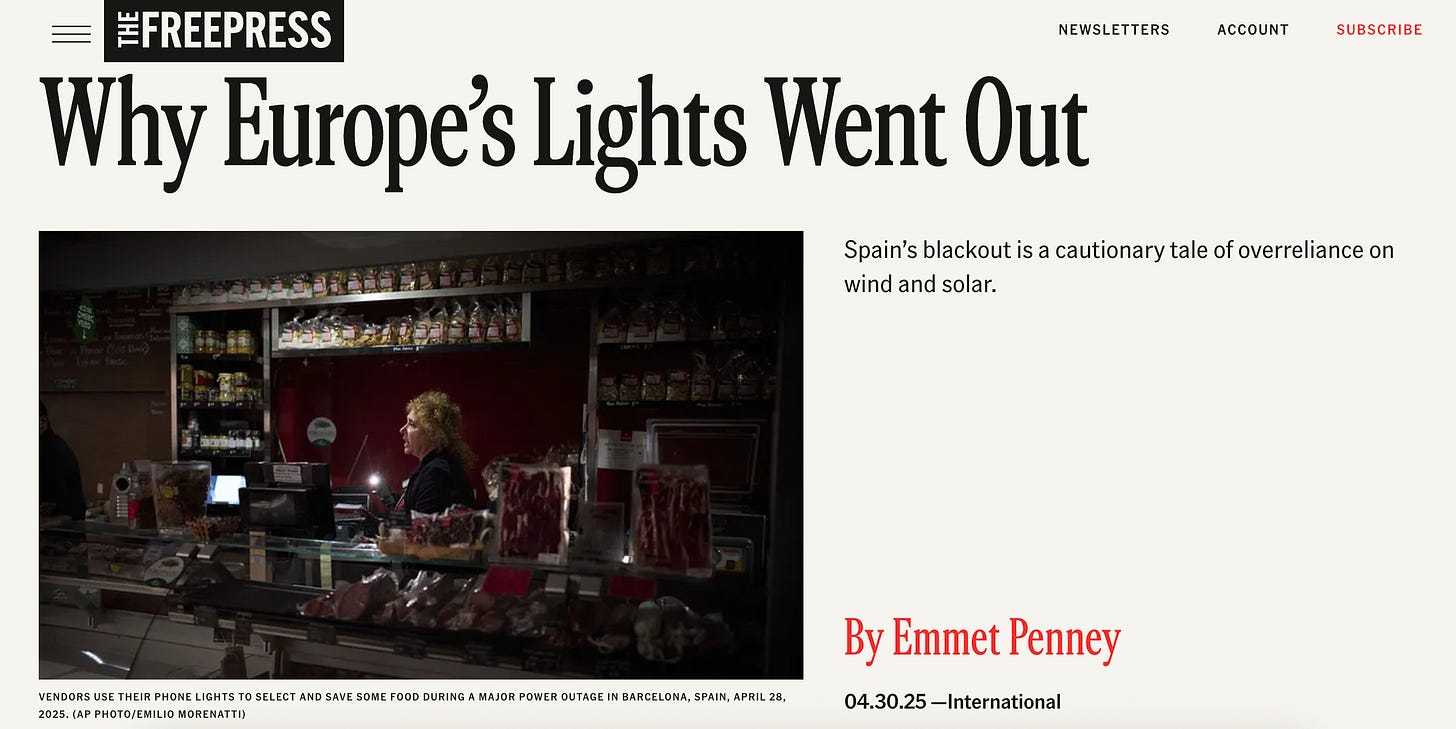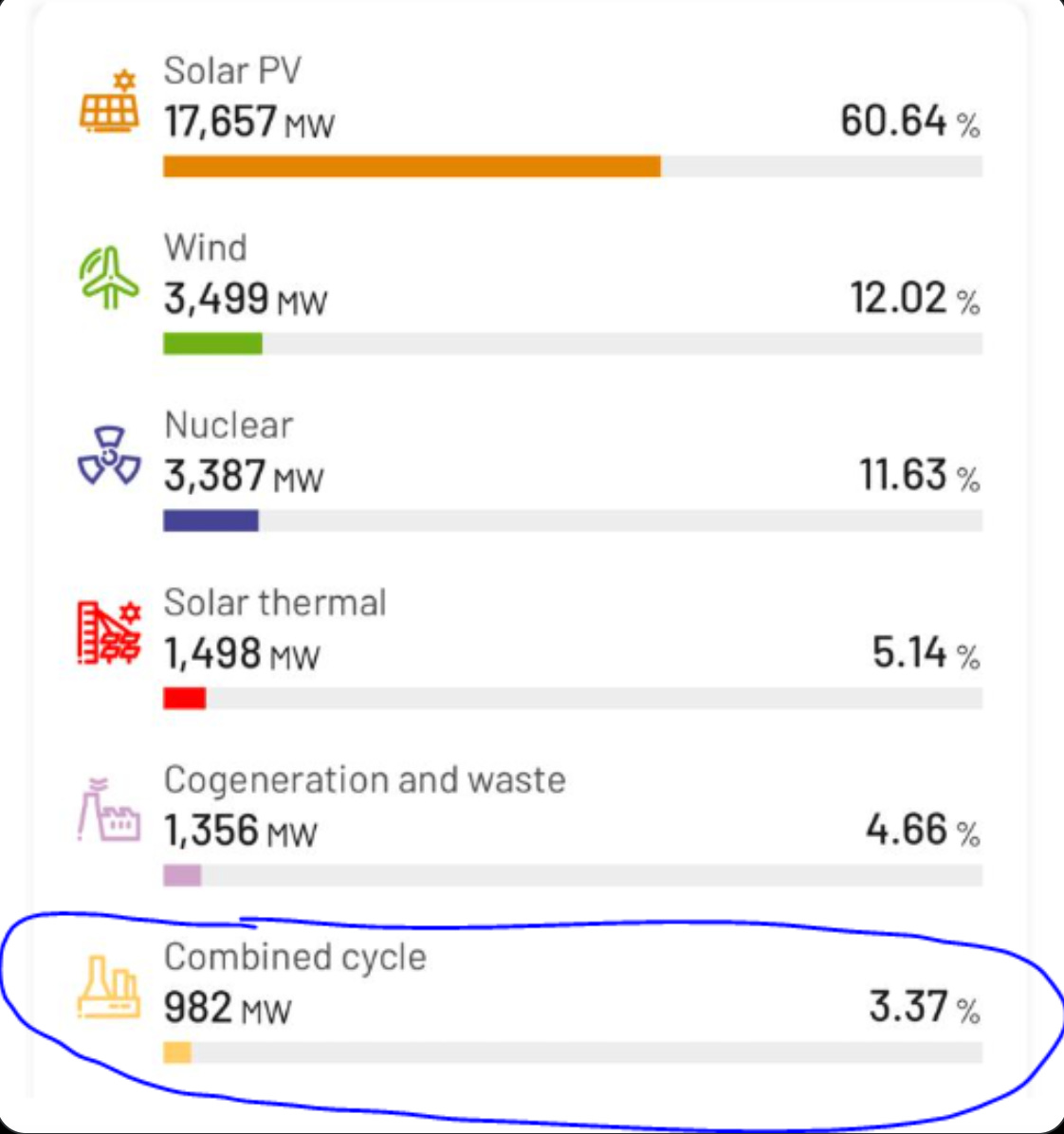I Got It Wrong
What really happened in Spain
In April, blackouts darkened Spain. Trains stopped, traffic lights blinked off, planes idled on runways. The Spanish government declared a national emergency.
I covered these events in a piece for Compact, which was then reprinted under a different title in The Free Press.
And my diagnosis was wrong — or, half-wrong.
This was my (as I admitted at the time) educated guess about what caused the blackouts:
Simply put, the power grid is like a giant game of tug of war. On one side, there’s demand, and on the other there’s supply. Keeping the lights on involves making sure the rope between supply and demand remains taut. This tautness is called inertia.
Healthy inertia means healthy grid frequency, which in Europe means 50 Hertz (in the United States it’s 60 Hertz). The Portuguese grid operator claims that something along one of its power lines disrupted the even flow of power between generators on its grid, which messed with the frequency, which likely tripped off more wind and solar, which slackened the rope, which probably caused the blackouts.
I guessed that a lack of firm, dispatchable resources on Spain’s grid had created inertial precarity. As Bloomberg’s Javier Blas reported at the time, thermal generation in Spain was at a troubling low just before the blackouts.
As I originally said, we wouldn’t know until a real post-mortem had been conducted and then released.
That report is now about to come out and early coverage indicates that my guess was wrong:
It wasn’t inertia; it was voltage.
Don’t take it from me — take it from Spain’s Minister of Energy, Sara Aagesen: “The grid didn’t have enough capacity to control voltage dynamically [with thermal power stations].”
In other words, there was, as Aagesen confirmed, a surge in voltage that the grid could not handle.
More firm dispatchable power, or more inverters to help manage renewables, were needed to avert this catastrophe. Inverters flip direct current power into alternating current power, which allows generation from variable renewables to move around on the grid while stabilizing power flow. So-called “grid-forming inverters” enable “solar and other inverter-based energy sources to restart the grid independently.”
According to Xiao Wang,1 an engineer who’s been delving into what went wrong during the Spanish blackouts, told me that this failure is “more unforgivable because inverters actually can be pretty good at handling those issues.”
In essence, the technology exists to avoid these issues and the buck stops with those who, for whatever reason, did not deploy them in order to avoid this kind of disaster.
The Spanish government also blames “conventional power plants, such as nuclear and gas-fired plants,” because they “failed to help maintain an appropriate voltage level in the power system that day.”
But Wang rejects the idea that thermal generation is to blame. In a post on Blueksy, he writes, “Poor renewable management is inclusive of mistakes in dispatching the necessary amount of thermals for all the reactive services you need since they carry all of it.”
Here’s the TL;DR:
I was wrong about what caused the blackouts—it wasn’t inertia issues, but voltage issues.
I was right that the blackouts bespoke poor management of renewable energy and a reckless renewable energy policy.
And I stand by my original conclusion:
Whatever the cause, this blackout could have a salutary impact on European energy policy if it dissuades countries from pursuing aggressive renewable energy policies that make power less reliable. If the grid slides into mismanagement, the results hurt everyone. As one energy executive put it to me: “The grid is a synchronous system with no graceful failure mode.” It is the industrial commons of modern society.





Here's more info from the crisis investigation committee: https://www.miteco.gob.es/es/prensa/ultimas-noticias/2025/junio/se-presenta-el-informe-del-comite-de-analisis-de-la-crisis-elect.html
While it is a commendable view that energy authorities will be more attentive to things like this, my spidey sense tells me they will need to suffer several more events if this nature before anything gets changed.